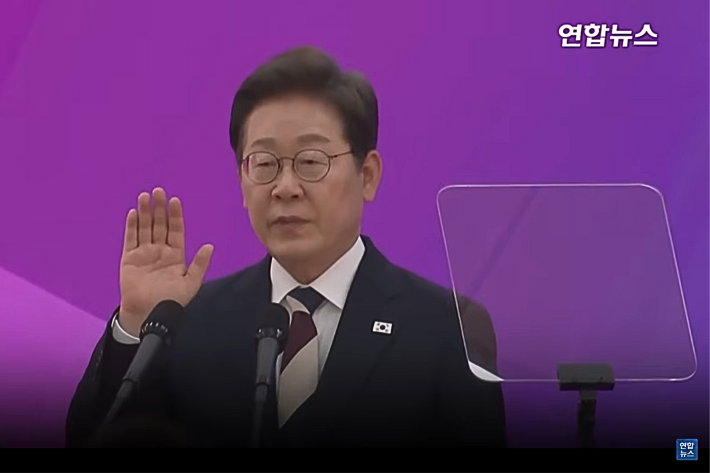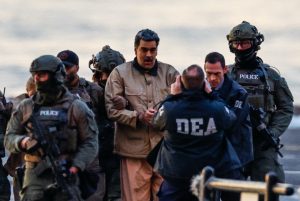South Korea’s new leader, Lee Jae Myung, has been preparing for his first meeting with US President Donald Trump on Monday, when he is expected to face a potentially rigorous test.
Lee, who won office less than three months ago, appears likely to encounter demands for a greater security ‘fee’ given Trump’s long-held view that his country is a “money machine” that takes advantage of US military protection.
Much is riding on the meeting for Lee, who took office in June after a snap election held when his conservative predecessor – welcomed in Washington for his hard line on North Korea – was removed for trying to impose martial law. Lee’s dealings with its prickly neighbour have been more benign, but he has already vowed to invest huge sums and undertake substantial industrial support in the US via a tariff deal negotiated in July.
ALSO SEE: China’s Boom and Bust Real Estate Giant Won’t be Missed
South Korea’s economy relies heavily on the US, with Washington underwriting its security with troops and nuclear deterrence. Lee hopes to chart a balanced path of cooperation with the US, while not antagonising top trade partner China.
As he headed to Washington, Lee sent a delegation to Beijing, which delivered a message calling for normalised relations with China that have been strained in recent years.
South Korea has long come under targeted criticism from Trump. Lee will seek to make a good impression, connect personally with Trump, and above all, avoid any unpleasant surprises, analysts said.
“For Lee, a no-news summit I think would be good,” Victor Cha of the Center for Strategic and International Studies, said.
As part of his preparations for the summit, Lee told reporters during his flight to Washington that he had read “Trump: The Art of the Deal”.
Cooperation on US shipbuilding
Under heavy pressure from Trump’s administration, South Korean negotiators secured a last-minute deal last month to avoid the harshest of new US tariffs, but they must still hammer out details about billions of dollars in promised investments in the United States.
South Korea vowed in late July to undertake a $450-billion package of investments in US projects such as shipbuilding, nuclear power, energy, chips, and a range of other sectors in return for US tariffs being cut from 25% to a more manageable 15%.
It agreed to purchase US energy products worth $100 billion, while $150 billion will be aimed at a shipbuilding partnership. A further $200 billion will go toward computer chip investments, plus nuclear power, batteries and biotechnology, according to Kim Yong-beom, the South Korean presidential office’s policy chief.
South Korean officials say they hope working-level trade negotiations will largely be left for other meetings.
“There are many major topics in the security field,” Lee’s top policy aide, Kim Yong-beom, said last week.
“Our position is that trade was already finalised last time. We hope that specific implementation plans for trade won’t be included in the summit at all, or at least should be kept simple if discussed.”
Several top officials, including the foreign minister, rushed to Washington over the weekend to try to iron out final details.
Lee, who arrived in Washington on Sunday, will highlight some of South Korea’s expected investments when he visits a shipyard in Philadelphia owned by the country’s Hanwha Group after the summit. Cooperation to help the ailing US shipbuilding sector is part of the broad tariff agreement reached between the countries.
Talks on defence spending, North Korea
Trump is expected to pressure Lee to commit to more spending on defence, including potentially billions of dollars more toward the upkeep of 28,500 American troops stationed in South Korea.
Wi Sung-lac, Lee’s top security adviser, said South Korea was in talks with Washington over defence spending, taking as a reference NATO’s agreement on a big new defence spending target. Wi added that the government was also looking into a plan for the purchase of American weapons.
While focusing on increasing military spending, Lee will likely seek to avoid conversations about a potential reduction of US troops or using them for a wider range of operations, or details on modernizing the alliance, said Duyeon Kim, from the Center for a New American Security.
Lee told reporters it would be difficult for Seoul to accept the demand by the US to adopt “flexibility” in operating the US military stationed in South Korea.
“They should leave those topics for working-level officials to hash out,” Kim said. “Ambition could backfire.”
Trump and Lee may also discuss efforts to persuade North Korea to freeze and eventually abandon its nuclear weapons programme. Both leaders support engaging Pyongyang, and Lee has called for a phased approach to denuclearisation.
North Korean leader Kim Jong Un says South Korea and the US remain hostile to his country and he will never give up his nuclear arsenal. Over the weekend, Kim supervised test-firing of new air defence systems.
Before Lee meets Trump, the South Korean leader travelled to Tokyo to meet Japanese Prime Minister Shigeru Ishiba on Saturday to underscore the importance of cooperation between South Korea, Japan and the US.
A commentary carried by North Korea’s state media on Monday criticised Lee’s “despicable” trip to Tokyo as a “begging message towards the master of the White House” by highlighting trilateral military cooperation.
Lee and Ishiba discussed relations with Washington and US tariff issues and the Japanese leader shared his experience with Trump, which for Seoul was useful information before Lee’s first meeting with Trump, said Wi, the South Korean security adviser.
- Reuters with additional input and editing by Jim Pollard
ALSO SEE:
S Korea to Invest $450bn in US Projects, Energy; Gets 15% Tariff
Tariffs Spur Big Tesla Deals With LGES Batteries, Samsung Chips
S Korea Forms Task Force to Speed up Trade Talks With US
South Korea Keen to Sell Submarines to Canada, Paper Says
CK Hutchison Ports Deal Deeply Entangled in US-China Trade War
Trump Plan to Revive US Shipbuilding, Cut Chinese Grip on Sector
US Probe Shows China Unfairly Dominates Shipbuilding: Sources
South Korea Crisis Deepens as Acting President Also Impeached
























